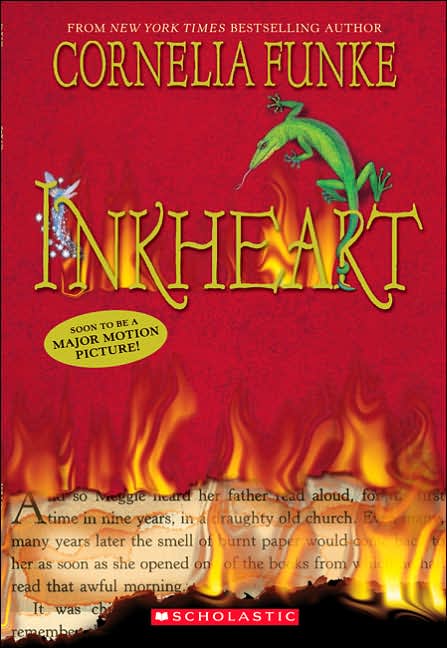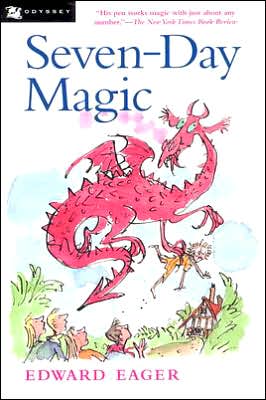At seven or eight years old I used to choose reading material by running my hand along the spines of the books in the library, convinced that when I found the right book I’d feel a buzz, a tingle, some physical communion with the item. I swear sometimes it happened. Though it might just have been a well-chosen font.
It can’t be all that uncommon, among book-lovers, to feel strongly that books are not just meaningful and cherished but actually magic—that all the love the reader has for a book, and all the time and attention the author put into it, invests it with something more than the sum of its parts, more than the words that comprise its intellectual content and the ink and paper and glue that make up its physical existence.
So it makes sense that the book as magical object shows up a lot in children’s fantasy. And it’s not always benign magic, either.
In fact, when a magical book appears in a book, it generally spells big trouble for the book-finding protagonist.
Maybe it’s that, for those of us who love books, there’s the sense that anything that brings this much joy, and has this much power, must have a shadow side. Who hasn’t stayed up way too late, in the grip of a novel, and felt, the next day, bleary-eyed at work or school, that the book must have put them under some not-entirely-benevolent spell? Librarians and booksellers (including me) oppose censorship, but when censors fear books and ascribe to them the power to destroy innocence or warp young minds, they’re at least acknowledging what we all know: that books have power, and that that power can be scary. Stories about magical, dangerous books plumb that fear—sometimes to humorous effect, and sometimes with a harrowing appreciation for the terror that can lie within the pages of a book.

Inkheart, by Cornelia Funke, delves right into the heart of that terror, when twelve-year-old Meggie discovers that her father, Mo, literally brings book characters alive when he reads aloud, and has inadvertently brought the villain Capricorn straight out of a book (called, naturally, Inhkeart ) and into the world. Not only that, but Mo’s ability is linked with Meggie’s mother’s disappearance nine years earlier, and now Capricorn has returned and Meggie and her father are both in danger.
The plot of Inkheart is a little convoluted for my taste, but its appeal is in the richness of its language (translated from the German by the wonderful Anthea Bell) and in the passion for reading that infuses every page. Funke has said that she wrote this book as a love letter to books and readers, and you can tell: Each chapter is prefaced with a quote from a beloved title, from The Wind in the Willows to The Princess Bride to The Secret of Platform 13 (someone looking for a solid grounding in children’s and classic fantasy could do worse than to take Inkheart‘s copyright-permission page as a guide). Meggie, her father, and her aunt Elinor are all bibliophiles, and Mo’s delicious insights about books could take up the rest of this post all by themselves: “If you take a book with you on a journey” he says, “forever after you only have to open that book to be back where you first read it yes, books are like flypaper—memories cling to the printed page better than anything else.” And then there’s my favorite: “Books have to be heavy because the whole world’s inside them.”

No one would ever describe Edward Eager’s Seven-Day Magic as heavy: like all Eager’s books, it’s a cheerful romp about a group of children who find a magic object. But Seven Day Magic is not as light as it appears; there is, in fact, a whole world inside it, and then some. It starts out simply enough, with five children in a library, discussing books:
“The best kind of book,” said Barbaby, “is a magic book.”
“Naturally,” said John.
There was a silence, as they all thought about this, and how true it was.
A few pages later, they find a red book, “smallish but plump, comfortable and shabby,” whose spine lettering has been mysteriously worn off. They open it, and find that it starts:
“The best kind of book,” said Barbaby, “is a magic book.”
“Naturally,” said John.
…etcetera. Right up to the point where they are standing, reading the book. Then the narrative stops, and the rest of the pages won’t turn. Our genre-savvy protagonists immediately suss out that the nameless volume is exactly the kind of magic book they’ve always wanted, and that they only need wish on it to be propelled into the stories they’ve longed to enter.
What makes Seven-Day Magic so much fun is the children’s matter-of-fact comfort with the logic of both magic and stories. When the youngest child is kidnapped by a dragon, and the others try to rescue her, they meet an elderly gentleman and ask him to help with the rescue:
“Well, I’ll try,” said the round gentleman, “but I doubt if I’ll be much help.”
“Of course you will,” said Susan encouragingly. “It stands to reason. The book wouldn’t have brought you in otherwise.”
Eventually, the story becomes slightly less surreal and turns to the children’s own family lives, which they improve by wishing on the book; they then return the red book to the library, under the ambiguous gaze of the librarian, and go their merry ways.
But early on, Susan asks an unnerving question, which is never fully answered:
“Do you suppose,” said Susan, “we’re not really real at all but just characters in this book somebody wrote?”
It was a sobering thought.
The children manage to shrug this off, but the reader never really can, because of course Susan is right. And if she’s right about herself and the other characters in the book, who are all quite convinced that they’re real, what about us, the readers?
Sobering, indeed.
Library photo by Joel Bombardier used under Creative Commons license
Elisabeth Kushner read a story once about a librarian in Vancouver who picked up a book to reread for a blog post, fell into it, and was never seen again.










